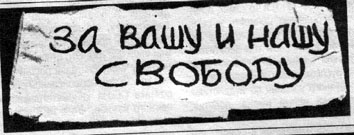During the night from the 20th to the 21st August 1968, five armies of the Warsaw pact crossed the borders of Czechoslovakia. During the first phase of the operation organized by the Kremlin, Czechoslovakia was invaded by about 100,000 soldiers, 2300 tanks and 700 airplanes. With relation to the occupation, 290 people were killed and 577 were seriously injured. It was a reaction to the gradual loosening of the totalitarian system, called "Socialism with human face," which ultimately led to the abolition of censorship early in 1968 and the so-called "Prague Spring." It was followed by long years of "normalization," which was ended by the Velvet revolution in 1989.
"Little Brother, Close the Gate" Thanks for composing and uploading to muv69
The Czechs, in their history, learnt to laugh at tragedies they could do nothing about: "A Well Intended Advice - Go Home, Ivan!" (And never come back. Ever.) Thanks for composing and uploading to bwdbwd
Paradoxically, my heroes come from the ranks of the "villains." On the 25th, eight people made a hard choice between clear conscience and imprisonment. Eight Russians went to the Red Square in Moscow and demonstrated against the Soviet invasion in Czechoslovakia. Their names were Larisa Bogoraz (whose husband, a writer, had previously been sent to Gulag for "anti-Soviet activity"), Konstantin Babitsky, Vadim Delaunay (a poet, died in Paris, aged 35 of a heart attack), Vladimir Dremluga, Pavel Litvinov Natalya Gorbanevskaya (a writer and poet, her blog is here), Viktor Fainberg, and Tatiana Baeva. Some of them ended up in jail, some of them in asylums, some in forced exile in Siberia.
For your and our freedom
The story continues. Forty years later, on the 24th August 2008 (not on the 25th, so that the police forces wouldn't be ready), seven activists went to the Red Square to remember this event. According to Novaya Gazeta, they were holding up a banner with the same slogan and were handing out leaflets: "There are again political prisons in this country [...] Love for country has been replaced with the love for leaders." The entire action (which had been authorized by the authorities) lasted five minutes. The police confiscated their banners and arrested the three activists who didn't manage to escape. They tried to confiscate the journalists' cameras and arrested correspondents of Novaya Gazeta, Grani-TV, The New Times and Vedomosti. The journalists were released the same day, the activists the following. The situation is not as bad as in 1968, but not too good, either - and could get worse. (NY Times article here)
Photos: Wikipedia and Novaya Gazeta, respectively


No comments:
Post a Comment